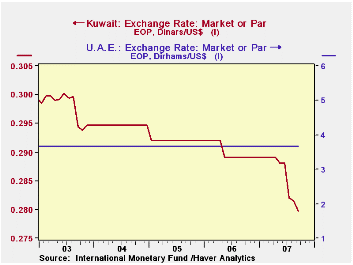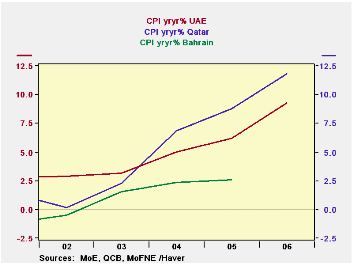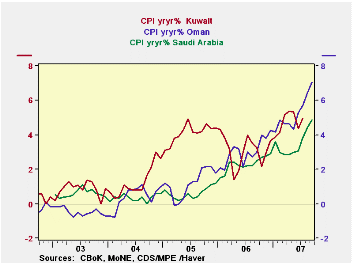 Global| Dec 04 2007
Global| Dec 04 2007Are the Gulf States About to Abandon Their Dollar Pegs?
Summary
The countries included in the Gulf Cooperation Council (GCC)--Saudi Arabia, Bahrain, Kuwait, Oman, Qatar and the United Arab Emirates--have, with the exception of Kuwait, pegged their currencies to the U. S dollar for over the past [...]

The countries included in the Gulf Cooperation Council (GCC)--Saudi Arabia, Bahrain, Kuwait, Oman, Qatar and the United Arab Emirates--have, with the exception of Kuwait, pegged their currencies to the U. S dollar for over the past ten years or so. Kuwait has allowed its currency to float in a narrow band but, in May of this year, formally abandoned the dollar peg and switched to a basket of currencies. The UAE's dirhams per us dollar, as an example of the stability in the exchanges of all the five non Kuwaiti currencies and Kuwait's dinars per dollar are shown in the first chart. By the end of September, the Kuwaiti dinar had appreciated by slightly more than 4% since the peg was abandoned.
At the conclusion of the recent GCC annual meeting, the Qatari Prime Minister, Sheikh Hamad bin Jassem al-Thani said the group, excluding Kuwait, had decided to keep the dollar peg. However, doubts regarding the resolve of the individual countries have begun to surface. All six of the gulf countries have been experiencing rapid and rising price increases. For the three countries that report monthly data, year to year price increases are running between 5 and 7% as shown in the second chart. Current data for inflation in Bahrain is woefully lacking. The latest report is for the year 2005. While the consumer price index rose only 2.6%, this represented a substantial change from the deflation that had taken place earlier. Current inflation data for Qatar and the U.A.E are also scarce, but the recent annual data are of concern. In 2006, the consumer price index rose 9% in the U.A.E. and 12% in Qatar. The inflation rates for the three countries that have only annual data are shown in the third chart. Inflation pressures were a factor in Kuwait's decision to abandon it peg in May.
Data on the GCC countries can be found in the country sourced
data in the EMERGEMA database and in the IFS
database.


| GULF COOPERATION COUNCIL | Sep 07 | Aug 07 | Jul 06 | Jun 06 | 2006 | 2005 | 2004 | 2003 | 2002 |
|---|---|---|---|---|---|---|---|---|---|
| INFLATION | |||||||||
| Bahrain | n.a. | n.a. | n.a. | n.a. | 2.6 | 2.4 | 1.6 | -0.5 | |
| Kuwait | n.a. | n.a. | 5.0 | 4.5 | 3.1 | 4.1 | 1.2 | 0.9 | 0.5 |
| Oman | 7.1 | 6.5 | 5.7 | 5.3 | 3.0 | 1.2 | 0.4 | -0.6 | n.a. |
| Qatar | n.a. | n.a. | n.a. | n.a. | 11.8 | 8.8 | 6.8 | 2.3 | 0.2 |
| Saudi Arabia | 3.0 | 3.1 | 3.8 | 4.4 | 2.3 | 0.6 | 0.4 | 0.6 | n.a. |
| United Arab Emirates | n.a. | n.a. | n.a. | n.a. | 9.3 | 6.2 | 5.0 | 3.1 | 2.9 |
More Economy in Brief
 Global| Feb 05 2026
Global| Feb 05 2026Charts of the Week: Balanced Policy, Resilient Data and AI Narratives
by:Andrew Cates





